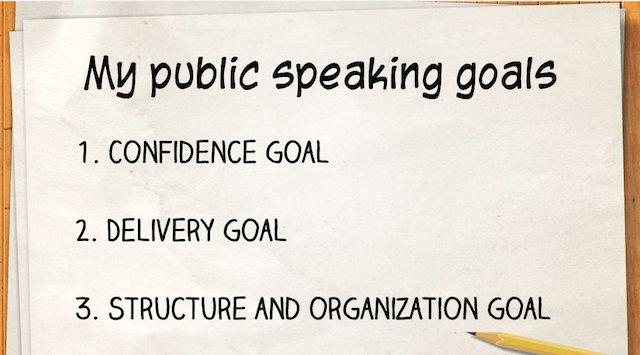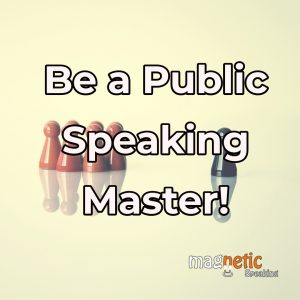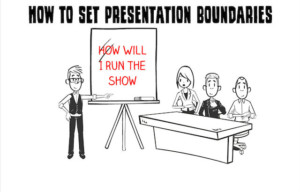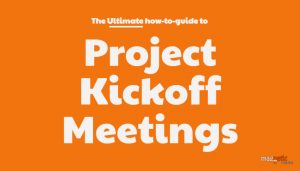Very few people set public speaking goals. Even when they know public speaking is an important skill for their personal and professional lives.
Why?
There is one big reason that I can think of: They don’t know how to do it.
Hopefully, this article is going to simplify the process for you and help you set at least three public speaking goals for yourself. I will share with you the same process I used to set my public speaking goals as I went from an introverted engineer to a professional speaker in less than two years.
First step: Understand why public speaking is important for your career and life
You know deep down that if you can speak and articulate yourself with clarity and confidence, you will have a better career track, more job opportunities, and less stress in your professional and personal life.
Many studies show a correlation between your public speaking skills and success. For example, a 2013 survey of 1000+ executives by Distinction Communications, indicated that 86% of participating executives attributed a direct correlation between their public speaking skills and their career success. Executives who succeed in their careers understand the power public speaking skills bring to their professional lives.
How about you? Why public speaking is important to you specifically?
Second: break your public speaking goal into three categories:
A lot of times public speaking is viewed as a big and overwhelming subject to tackle. Early in my career, I heard one of my mentors say that learning public speaking and eating an elephant is similar: You have to do it one bite at a time. I learned to break public speaking into three bites, or three categories and that helped me tremendously.
Three categories of public speaking development
1 – Confidence
2 – Delivery
3 – Structure and Organization
Third: Set a goal for each category.
Once you have the three categories, you have to set a goal for each. Each goal has to be specific, timely, and measurable. This works best if you do it in writing or typing. Get a pen and paper or pull out a document on your computer and type it in.
The first category you want to set a goal for is your confidence. This a corner-stone category; without it, nothing else matters. You can have the best content ever, and you can know all the bells and whistles of delivery, but if you can’t stand in front of a group without shaking in your boots, everything gets thrown out of the window.
Write or type your goal now for this category. Use the examples below to guide you.
- By June 1st 20xx, I speak in front of groups of people and feel comfortable. (note that I use present tense for the goal).
- By March 1st 20xx, I speak in front of the executives in my company with the same confidence I speak in front of my direct reports. (note that I measure the goal based on my feeling, not by what other people say).
- By April 1st 20xx, I feel comfortable applying for a leadership position that requires public speaking.
How to keep your audience engaged, how to keep your audience entertained, how to move on stage, and what to do with your hands, all fall under delivery.
Write or type your goal now for this category. Use the examples below to guide you.
- By February 1st 20xx, I know how to engage my audience in three different ways.
- By March 1st 20xx, I move on stage with purpose and modulate my voice.
3 – Structure and Organization
How to structure your talks, how to structure your executive briefings, how to structure your project updates, and how to structure a conference talk vs a technical talk, all fall under structure and organization.
- By March 1st 20xx, I know how to structure a presentation from beginning to end.
- By June 1st 20xx, I can structure my thoughts on the spot at executive meetings.
- By June 1st 20xx, I know how add emotional elements to my presentations to engage my audience.
- By June 1st 20xx, I know how to structure business stories.
- By December 1st, 2014, I can create a presentation or a keynote in less than 1 hour. (When I set my writing goal, I chose this format, I wanted to be able to write a full 500-word article in 1 hour by December 1st, 2012 – and it worked).
Fourth: Get into action to make it happen.
Either take trainings, go to Toastmasters, hire a coach, attend a free workshop with us, or read a book. Then start applying and practicing at every opportunity you get until you achieve your goal.
The secret to getting better at public speaking is to do it and keep doing it. There are no magic bullets that will get you to speak better overnight. You have to put in the work and build the momentum.
Gladwell shared a study in his book “Outliers” showing that most of the famous geniuses that we know of have spent about 10,000 hours practicing their craft before they made any breakthrough in their field. That includes Einstein, The Beatles, and Mozart. These people did not become geniuses overnight, they had to work on it.
The same applies to you. Look at your reasons for why public speaking is important to you and ask yourself if you are willing to put in the work to become better. If the answer is yes, then you have many resources available for you including but not limited to Magnetic Speaking.



